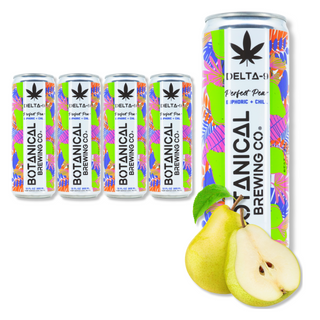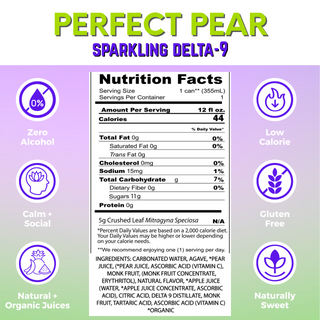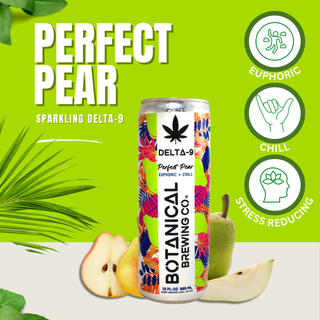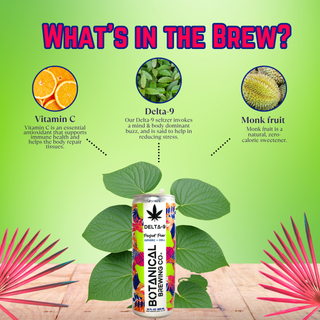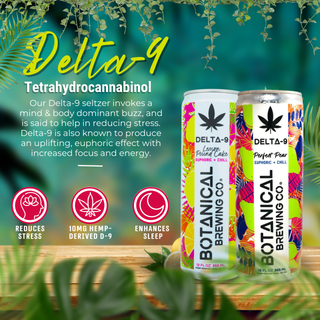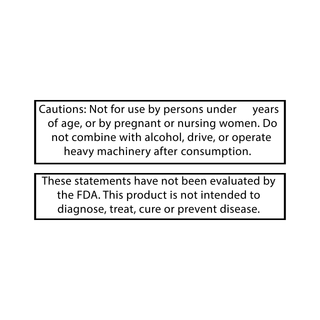Delta-9 is a substance that is attracting more and more attention due to its unique properties. It has a significant impact on the body, which raises many questions and requires a detailed study. In this article, we'll take a look at what Delta-9 is, its features, and the possible consequences of its use.
Quick answer: What is Delta-9?
Delta-9-tetrahydrocannabinol (Delta-9-THC) is the main psychoactive component of cannabis that causes euphoria. It interacts with cannabinoid receptors in the brain, affecting mood, memory, coordination, and time perception. Delta-9 also has potential medicinal properties, such as analgesic and antiemetic, but its use requires caution due to possible side effects such as anxiety and cognitive impairment.
Origin and basis
Delta-9-tetrahydrocannabinol (Delta-9-THC) is a key component of cannabis known for its psychoactive properties. It actively affects the human central nervous system, making it the subject of numerous studies and discussions in the medical and scientific community. To better understand this component, it is important to consider its chemical structure and the history of its discovery.
Origin and chemical structure of Delta-9 THC
Delta-9-THC is one of more than 100 cannabinoids found in the cannabis plant. Its chemical formula is C₂₁H₃₀O₂, consisting of 21 carbon atoms, 30 hydrogen atoms, and 2 oxygen atoms. The molecule has a special cyclic structure with a double bond between the ninth and tenth carbon atoms, hence the name “Delta-9”. This structure allows Delta-9 to interact with the CB1 cannabinoid receptors in the brain, leading to changes in neural signaling and causing the typical effects associated with cannabis use.
A brief history of Delta-9 THC
Delta-9-THC was first isolated and identified in 1964 by Israeli scientist Raphael Meshulam. His discovery was an important step in understanding the chemical composition of cannabis. Over time, research on Delta-9-THC has led to the creation of synthetic cannabinoids, as well as the development of medicines based on this component. Despite its “young” age, Delta-9-THC has already had a significant impact on science and medicine.
How Delta-9 affects the body
Delta-9 is one of the most well-known substances that has a significant impact on the body. Its effects span a wide range of effects, from psychoactive, mind-altering to potential medical applications. In this section, we will look at how Delta-9 affects the body and brain, as well as what opportunities it opens up for medical needs.
Psychoactive effects and impact on the body
Delta-9 affects the body through its connection to the endocannabinoid system, in particular, the CB1 and CB2 receptors located in the brain and other parts of the body. When ingested, Delta-9 causes changes in neurotransmitters, which leads to various psychoactive effects.
The main effect felt is an emotional and cognitive change, often described as “euphoria”. People may experience elevated mood, relaxation, and altered perceptions of time and space. These effects can be attractive to some, but also carry risks, especially when used in excess.
Other effects include changes in appetite (often an increase), dry mouth, increased heart rate, and potentially decreased coordination. In some cases, anxiety or paranoia may occur, especially in people prone to mental disorders. Prolonged use can lead to the development of tolerance, when more of the substance is needed to achieve the same effect, which increases the risk of dependence.
Medical uses of Delta-9 THC
Delta-9 also has significant potential in medical applications. This compound is used to alleviate the symptoms of a number of conditions, including chronic pain, nausea, and loss of appetite. Its analgesic properties make Delta-9 effective in cases where traditional painkillers fail or cause unwanted side effects.
Delta-9 is also used to reduce the symptoms of multiple sclerosis, including muscle spasticity. In addition, the substance may be useful in the treatment of conditions such as post-traumatic stress disorder (PTSD) due to its ability to reduce anxiety and stabilize emotional states.
Delta-9 is also being investigated as a means of relieving nausea and vomiting, especially in patients undergoing chemotherapy. Its ability to stimulate appetite is useful for patients with HIV/AIDS and other diseases accompanied by anorexia or significant weight loss.
However, it is important to note that the medical use of Delta-9 should be strictly controlled and dosed, as excessive or inappropriate use can lead to negative health effects, including the risk of developing mental disorders.
Safety and risks of Delta-9
Delta-9-tetrahydrocannabinol (Delta-9 THC) When using Delta-9-tetrahydrocannabinol (Delta-9 THC) for medicinal and recreational purposes, it is necessary to consider the possible health and safety risks of prolonged or uncontrolled use.

Risks and side effects of Delta-9 THC
Regular use of Delta-9 THC can cause a number of side effects. The most common ones include:
- Mental disturbances: Anxiety, paranoia, and panic attacks can occur when using large doses. In some cases, symptoms of psychosis are possible, especially in people with a high susceptibility to mental illness.
- Cognitive impairment: long-term use can negatively affect memory, concentration, and learning.
- Physical dependence: frequent use can lead to the development of tolerance and dependence, accompanied by withdrawal symptoms (irritability, anxiety, sleep disturbance).
- Cardiovascular problems: increased heart rate and blood pressure can be a risk for people with cardiovascular disease.
- Respiratory complications: smoking cannabis increases the risk of airway damage, which can lead to chronic cough and bronchitis.
Is Delta-9 safe to use?
Short-term and moderate use of Delta-9 THC is generally safe for most people, but long-term use can lead to serious complications. To minimize the risks, you should:
- Adhere to the recommended dosages: exceeding the dosage increases the likelihood of negative effects.
- Limit the frequency of use: regular use contributes to the development of dependence and cognitive impairment.
- Avoid smoking: this is the least safe way to consume because of the risks to the respiratory system. Consumption through food or other smokeless methods is preferable.
- Consultation with a doctor: especially important for those with a predisposition to mental disorders or cardiovascular disease.
Ultimately, the use of Delta-9 THC should be well-considered, taking into account the potential health risks.
The legal status of delta-9 THC
In the United States, the legal status of delta-9 THC varies from state to state. While cannabis containing more than 0.3% delta-9 THC remains illegal at the federal level, a number of states have legalized it for medical or recreational use. However, laws vary considerably.
Features and exceptions
- Legalized in some states: States such as California, Colorado, and Washington allow both medical and recreational use of delta-9 THC.
- Medical use: In a number of states, including Florida and New York, only medical use is allowed with a special license.
- Prohibited in some states: In some states, delta-9 THC remains completely illegal (Idaho, Nebraska).
Crossing borders
It is important to remember that even if the use of delta-9 THC is legal in a particular state, this does not apply to interstate transportation or international travel. Transporting products containing delta-9 THC across state or country borders can lead to serious legal consequences, even if the substance is legal at the point of origin or destination.

Delta-9 products and recommendations
Delta-9 THC is available in a variety of forms, from classic smoking products to edibles or oil concentrates. The choice of product depends on the individual needs and experience of the user. In this section, we'll take a look at what delta-9 products are available and what to look for when choosing them.
Delta-9 products: what to choose?
Delta-9 THC products are available in different forms, each with its own benefits and features:
- Cannabis flowers
- This is the classic form of consuming delta-9 THC by smoking or vaporizing. It provides a quick effect, but can negatively affect the respiratory tract.
- Advantage: fast onset of action.
- Disadvantage: possible respiratory problems.
- Edible products
- Gummies, chocolate, or other products with the addition of delta-9 THC. They are popular because of their convenience and the absence of the need to smoke.
- Advantage: long-lasting effect without affecting the lungs.
- Disadvantage: slow onset of action (30 minutes - 2 hours).
- Oils and tinctures
- Delta-9 THC oils can be used both sublingually (under the tongue) and in food. They allow for more precise dosage control.
- Advantage: precise dosage and the possibility of covert use.
- Disadvantage: not always suitable for people who need an immediate effect.
- Vapes and cartridges
- Vaporizing delta-9 THC allows you to get a quick effect without the need to smoke. However, it is important to consider the quality of vape products to avoid harmful impurities.
- Advantage: fast action and relatively less impact on the lungs.
- Disadvantage: the possibility of low-quality or fake cartridges.
What to look for when choosing a product with delta-9?
When choosing a delta-9 product, it is important to consider several key factors:
- Quality and certification
- Products must have quality certificates that confirm their purity and compliance with regulations. This is especially true for vape cartridges and edibles, where fakes can be harmful to health.
- Recommendation: check for independent laboratory tests on the manufacturer's website.
- Dosage.
- Choosing the right dosage depends on individual tolerance to delta-9 THC. Beginners are advised to start with low doses and gradually increase them.
- Recommendation: for beginners, it is better to choose products with a dose of 5-10 mg per serving.
- How to use
- Your lifestyle and needs may determine your choice of product. For those looking for an immediate effect, smoking or vaping products are better suited, while for a long-term effect, edible forms are better.
- Recommendation: for a long-lasting effect, choose edibles or oils.
- Potential allergens and additives
- When choosing edible or vape products, it is important to consider the presence of additives or flavors that may cause allergies or be harmful to health.
- Recommendation: avoid products with untested additives or chemical components.
When choosing products with delta-9, you should pay attention to the quality, dosage, and method of use to ensure the safest and most comfortable use.

Delta-9 versus other types of delta: What's the difference?
Delta-9 THC is the main psychoactive component of cannabis, but there are other variants of the cannabinoid, such as Delta-8 and Delta-10. While they all interact with cannabinoid receptors in the body, their effects, legal status, and uses vary considerably. Below is a comparison of the main types of Delta.The difference between Delta-9, Delta-8 and Delta-10
-
Psychoactivity:
Delta-9 has the strongest psychoactive effect of all the delta species. Delta-8 THC, while having similar effects, is less intense, while Delta-10 is known for weaker psychoactivity that is more stimulating than relaxing. -
Legal status:
Delta-9 THC is the most strictly regulated. Although it is legalized for medical or recreational use in many states, cannabis with Delta-9 in concentrations above 0.3% remains illegal at the federal level. Delta-8 and Delta-10 currently have a looser legal status, but in some states their sale is also restricted or prohibited. -
Effects and duration:
Delta-9 produces a faster and more intense effect, but its duration of action is usually shorter. Delta-8 is known for its more gradual effect and longer lasting effects, while Delta-10 is often used for energy enhancement and has relatively mild but long-lasting effects.
This difference between the types of delta allows users to choose the substance according to their needs and expectations.
|
Characteristic |
Delta-9 THC |
Delta-8 THC |
Delta-10 THC |
|
Psychoactivity |
High |
Medium |
Low |
|
Effects |
Euphoria, mood changes |
Milder euphoria, relaxation |
Energy boost, mild euphoria |
|
Legal Status (USA) |
Legal in some states |
Legal in most states, somewhat regulated |
Legal in most states, but unclear |
|
Medical Application |
Pain relief, nausea, anxiety treatment |
Anxiolytic, anti-inflammatory |
Energy stimulant, potential for future research |
|
Duration of Effect |
2 to 6 hours |
4 to 8 hours |
3 to 6 hours |

Conclusion
Delta-9 THC is a complex and multifaceted topic that requires a responsible approach. If you decide to try products with Delta-9, it is important to be well-informed and aware of your choices. Always consult a healthcare professional before use, especially if you have a chronic medical condition or are taking other medications. Remember that your health and safety should always come first. Research, read, and make the choice that is right for you, taking into account all the possible risks and benefits.



